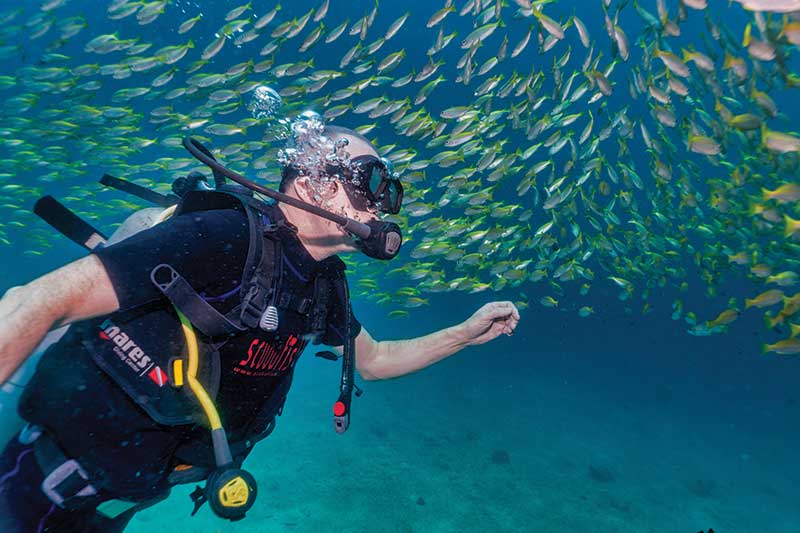Aging and Diving
By Divers Alert Network

Scuba diving offers incredible experiences and benefits, and it appeals to people of all ages. Many pick up the activity later in life, and while age itself doesn’t prevent people from diving, it is associated with a decline in functional capabilities and an increased risk of certain diseases.
For older people who are returning to diving after an extended break, it’s especially important to ensure their current health and fitness levels are adequate to meet the physical demands of diving—from lifting tanks to swimming against currents.
While every person’s health status is different, there are some general considerations that apply to divers over 65, and some actions that those over 45 should begin taking. By undertaking measures such as maintaining fitness and scheduling an annual physical, divers can enhance their ability to partake in the activity for years to come.
Cardiovascular health and fitness
Although a leisure activity, diving does require a degree of physical fitness. Generally, you should be able to perform surface swims and have the strength to board a boat post-dive. Fatigue is often a significant contributing factor in cases of panic.
From yoga to running to weightlifting to long walks, find a way of staying fit that you enjoy. If you took a break from both exercise and diving, ease back into fitness slowly to avoid injury—don’t expect your body to perform at the level it was.
Cardiorespiratory health is very important: having a healthy set of lungs and a strong heart will set you up for success in diving and beyond. Any symptoms such as coughing, congestion, shortness of breath or difficulty breathing could impact a dive and be a sign of something serious—a trip to the doctor may be in the cards.
Chat with your doctor
Health and fitness are more important than age, and for divers older than 45, annual physical exams are recommended. During these appointments, you’ll be able to discuss any questions, concerns or issues with your doctor. By staying proactive and addressing issues early, you’ll limit their potential to become bigger problems in the future.
A helpful resource as you navigate this is DAN’s Guidelines for Lifelong Medical Fitness to Dive, available at DAN.org/Return. This guide enables divers of all ages to quickly note what steps they should take—and how frequently—to ensure optimum health and fitness for diving.
In addition to an annual physical, DAN suggests divers older than 65 complete a medical evaluation form prior to their doctor’s visit. Completion of this newly revised form works in tandem with going to the doctor and helps in the overall assessment process.
Considerations for conditions
Before scheduling your next dive, assess your current medication regimen and any known diseases and conditions—these could be relevant how your body handles a dive. Examples include medications that induce drowsiness or cardiac disease, which now accounts for the most deaths in recreational diving.
If you have any concerns about how a medication or condition could impact a future dive, either talk with a dive-medicine-trained physician or call the DAN Medical Information Line at +1 (919) 684-2948.
Adapt your dive
You may find the way you experience dives changing as you age. A warmer wetsuit or different dive accessories may prove necessary as the body’s thermal tendencies naturally change. And your ability to task-load may evolve, too. The stresses associated with tasks like photography could become too much. Check in with yourself, and if you need a break from your camera, for example, put it down to enjoy the dive itself. Limiting dive depths and times may also be a reasonable decision as you continue to dive throughout your life.
Some positives come with aging: older divers have accumulated knowledge and experiences that can promote calm and confidence in the water, and they may be more prudent when planning dives. Retiring from diving may not be needed for a long time: your decision about continuing to dive should be based upon your doctor’s advice, your overall health and your confidence in your abilities as a scuba diver.
For more safety information on safe diving practices visit: www.dan.org
Leave a Comment







